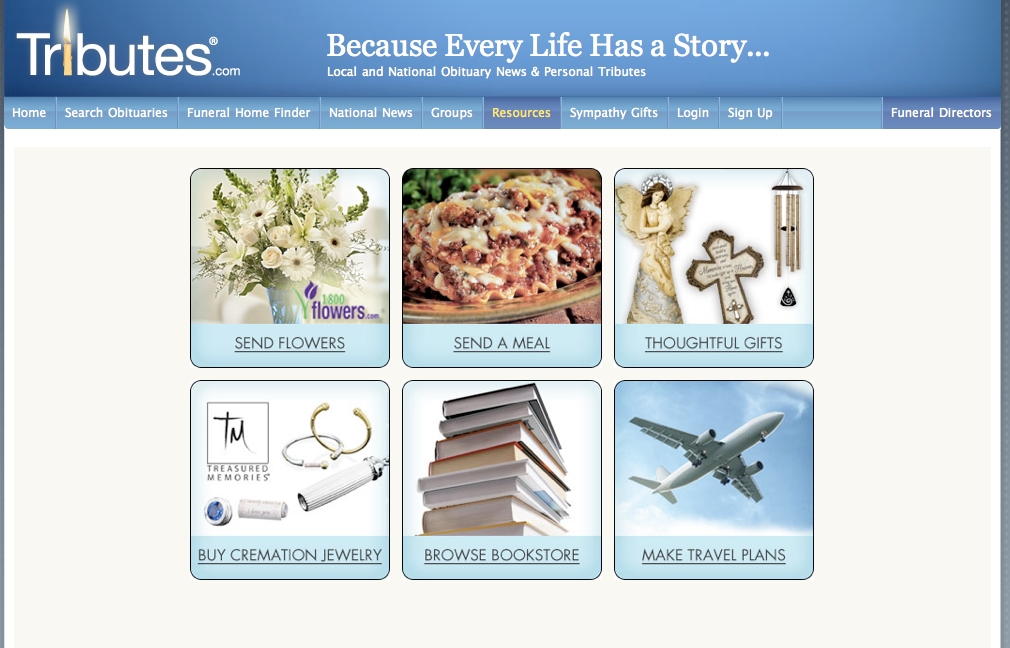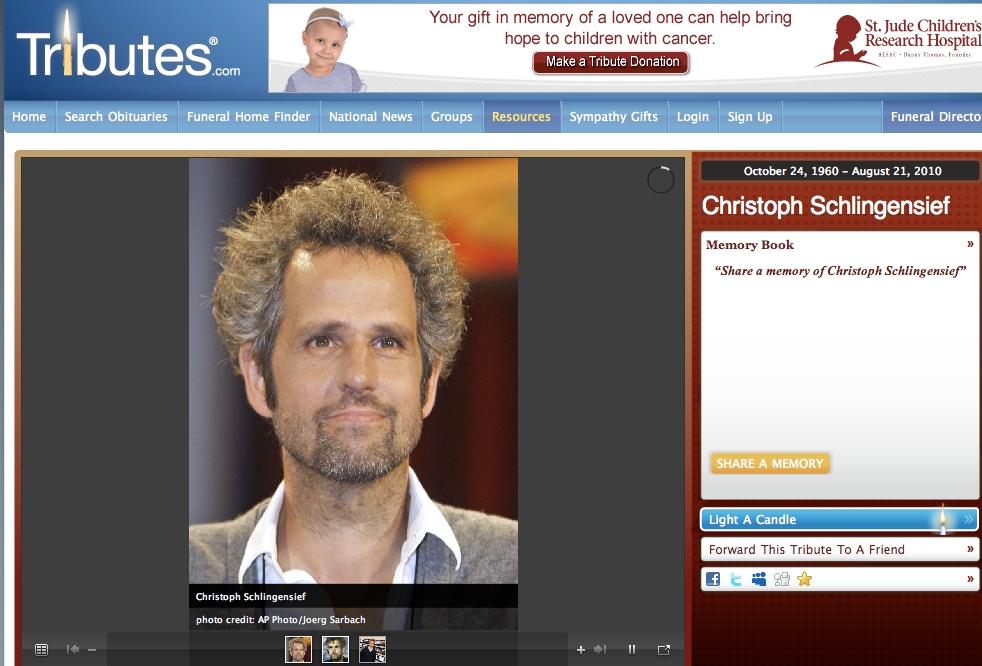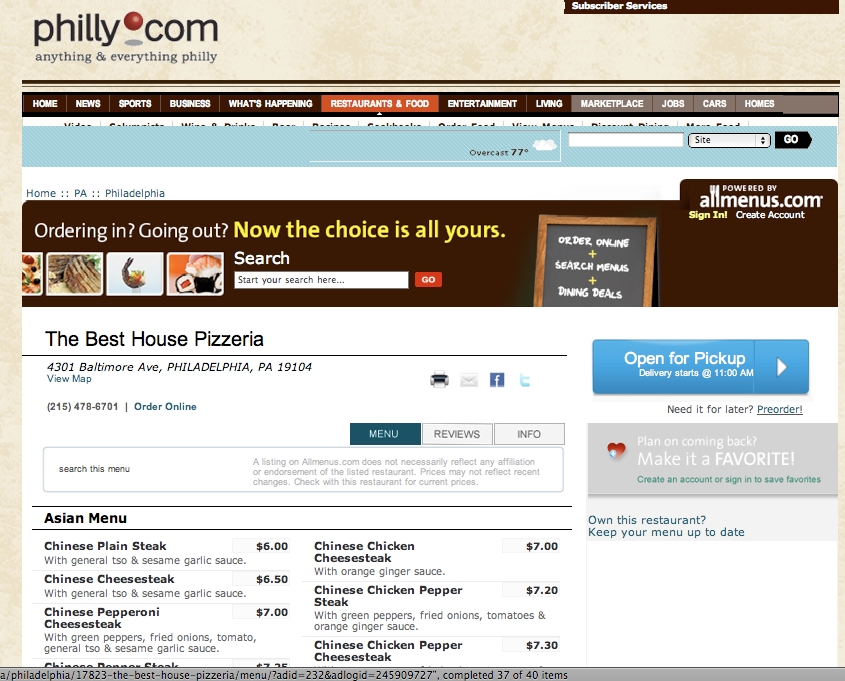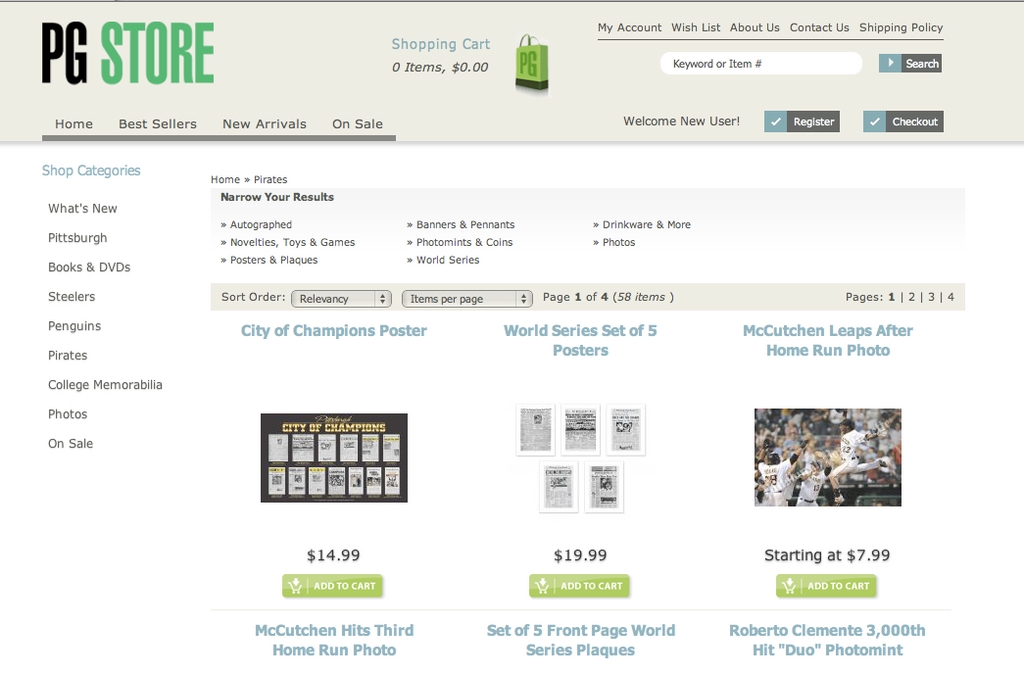Nine ways to grow user-generated revenues
There’s a good case to be made that the most overlooked source of new revenue for digital media companies is user-generated revenues – ie from visitors not “advertisers." As Pat Scanlon, director of Interactive for Post Gazette company says, “We’ve neglected this category for 15 years." One of Scanlon's focuses at the Gazette is to build out this revenue stream.
"Conceptually, user-generated revenues are most similar to classifieds," he says: "Large audiences making a number of small, long tail transactions."
Here are eight kinds of user-generated transactions you may want to test, starting with Scanlon’s top four initiatives at the Post Gazette:
1. Online stores
A great way to test online stores is to set up one for the media's own promotional products, such as reselling local photographs, posters of famous front page stories or mugs with the TV station's branding.
The PG store, at the PostGazette.com sells primarily sports memoriabilia, such as Steelers Super Bowl glasses (one for each year) and posters that incorporate front page stories of famous games. This stores does “six to seven figures” in revenues and is looking to expand the store into selling other items. A vendor for selling prints of photos and items with photos images, such as mugs, calendars and posters is Pictopia.
LC E-commerce solutions, reviewed here, also offers an e-combanner that allows sites to sell products directly from banner ads; their first partner, GoErie.com is selling their own products on the banner ad.
2. Fantasy Sports
FanDuel.com is in pre-release with PG+ (membership sport site on Post-Gazette.com) with the first reports coming in at the end of the month (see our write-up up on this company here in "Top Ten Technology Finds of 2010". The site allows visitors to sign up to create a fantasy team for just one game, deposit money and play against five or ten other players for the collective pot (the system matches players with others willing to bet a comparable amount). If you win, you get the pot, minus 10% that goes to the “house," which FanDuel splits 50/50% with its media partners.
Games are promoted with contextual ads and links on sports articles. Technically it isn’t gaming. Fantasy sports has an "exception in the Unlawful Gaming Act as it is deemed a game of skill with a pre-determined prize (that is not based on the outcome)".
So, the game is legal throughout the U.S.except for Maryland, Arizona, Louisiana, Vermont and Montana, which apparently doesn't allow competition with its own lottery. Their first partnership was with Philly.com.
3. Online food ordering
Post-Gazette.com was the first newspaper site in the country to partner with AllMenus.com, a site that collects menus from “90%” of the restaurants in an area and sets up online ordering for as many as it is able to acquire. The site allows users to see menu items and specials (including the immensely popular Half-Off), order online for either pick-up or delivery,or book a reservation through Open Table. Transactional revenues are split with media partners on a negotiable basis, depending on who "acquires" restaurants, (50/50 was a split CRO Anthony Willis mentioned at a convention). Scanlon also expects this initiative to provide revenues “in the six figure range” this year. There is no white label version of AllMenus.com though it settles for "powered by" status on Philly.com's site and in smaller markets the company relies on the media company to create the customer relationships and gives them a larger cut. See a complete review here.
4. Membership clubs
Scanlon’s ultra-successful paid members-only area, PG+, is sports-based but also includes a popular discount card (a full case study on this site is here). A key takeaway is that members don’t really buy the extra sports content, they buy the experience of being part of “the conversation” and community around games through participating in lots of live chats - Scanlon says threads on the site can run 400 to 500 posts long as people talk to eachother as well as local sports commentators made available behind the paywall.
Here are some additional areas for micro-transactions – it all adds up!
5. Reservations
The travel industry has a well-developed suite of travel products and affiliates. These are not designed for working cities like Pittsburgh but tourist-oriented markets like Santa Fe or Palm Springs. Take note: the market is increasingly competitive and since it relies on search more heavily than direct traffic smaller sites with better travel-oriented content have been able to successfully occupy the space. In fact, pureplay cityname sites have been quietly raking in the dollars from transaction-based selling; PalmSprings.com, a leader in travel products does more than $1 million in revenues. Scottsdale.com has also monetized almost every event and attraction on its site, and is now reselling its platform (read my blog on "City in a Box) to other pureplay city sites. Since many of the buyers come through search, the SEO for the site is as important as direct traffic. Ask any pureplay cityname.com owner; 90% of the traffic comes from search. A straight affiliate relationship with Hotels.com is one way to go, however, EZrez.com provides ecommerce for taking reservations for attractions and hotels, that can include golf or horseback riding. AREZ.com (contact info here) is another vendor you may want to try out.
6. Real estate
Athough real estate is one of the most mature markets online and currently suffering, a few sites have figured out how to revenue share on transactions that started on their site (including SanJose.com a site the author was involved in). State rules vary, but typically someone in the company has to hold a brokers license and the department may need to be up as a separate company. This allows putting the multiple listing widget on the site, from which you can send leads to a working broker or agent and legally take a cut of the proceeds. Each state has different rules so check with the board of realtors in your area. If anyone else out there is trying this model, we would love to hear from you.
7. Ticketing
Selling tickets directly from calendar listings has been around for a long time, but surprisingly few local media sites allow transactions. TicketLeap, Zvents and other vendors like TicketNetwork, a seller in the secondary ticket market, (a few contacts are here ) can add transactions to your events engine - or in the case of Zvents, replace yours with theirs, but that's a separate issue. You can also find all the ticket providers by going to Zvents.com, since they partner with all major ticket providers, both national and local. (Zvents is also powering a new pay-per-click user-generated events site on Goerie.com that is worth taking a look at).
8. Obituaries
Newspaper sites have long partnered with Tribune-owned Legacy.com. But a new vendor, Tributes has a new twist on the obituary market we have written about before. It partners with funeral homes to sell memorial postings; and since the homes share in the revenues, they recommend families use Tributes memorial products and services right in the ”arrangement rooms” of their “brick and mortar” facilities. Media partners also keep a share of the revenues from funeral companies they sign up.
advertisement
Families can purchase an unlimited amount of text and five photos for $10 a month. A multi-media product is also sold exclusively through the funeral parlors. A life-time memorial sells for a flat fee of $250 (Legacy charges $36.99 for the year). Legacy.com still had 12 million viewers compared to Tribute’s 500,000 viewers monthly in early 2010, but Tributes may be building a better mouse trap for families memorializing a loved one.
Most upgraded sales are to historical records the sites keeps, going back to the early 1900s and make it easy to post tributes to grandparents and other lost relatives who had gone unacknowledged. Not a company to miss a revenue opportunity, tributes to fallen celebrities also include memorabilia up-sells. Legacy on the other hand sends its users offsite to a paid search engine to find historical names.
Conclusion
Having spent some time around pureplay domainers, one thing we've learned about the mentality is content is rarely launched without a transactional element, at bare minimum some affiliates paying for clicks. In the process of a kind of entrepreneurial laziness they have discovered a number of secret annuities users making direct transactions of hotel rooms or specialized products. Their revenue is coming in through the "back-door" - or search - but companies with large amounts of front end traffic, such as newspaper and broadcast sites, and even high traffic blogs, need to rethink what they can sell to visitors, not just advertisers. For local sites the transactions follow the niches that the local media intends to own, whether it is Sports or Moms or Obits. Follow the visitor through to the end transaction. Many of them are on niche sites to get information to make a purchase.

The author, Alisa Cromer is publisher of a variety of online media, including LocalMediaInsider and MediaExecsTech, developed while on a fellowship with the Reynolds Journalism Institute and which has evolved into a leading marketing company for media technology start-ups. In 2017 she founded Worldstir.com, an online magazine, to showcases perspectives from around the world on new topic each month, translated from and to the top five languages in the world.
























